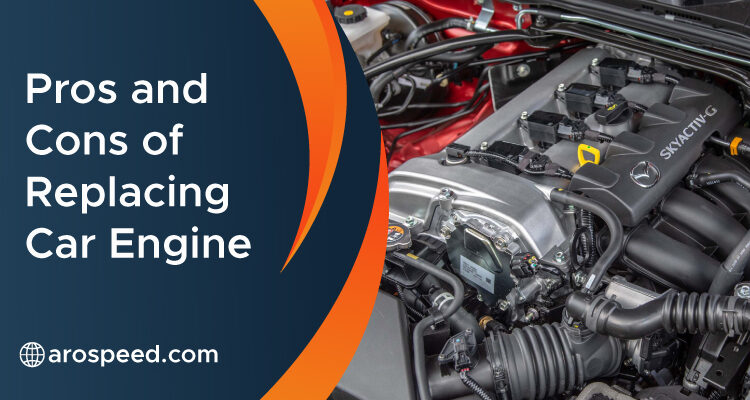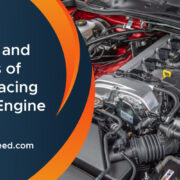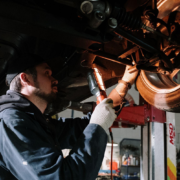Table of Contents
Introduction
When it comes to your trusty car, sometimes the heart of the matter is its engine. Whether you’re facing a costly repair or simply want an upgrade, replacing your car’s engine, also known as a New Engine, can be a tempting solution. But before you rev up your decision-making engine, it’s crucial to understand the pros and cons that come with this choice. In this brief guide, we’ll take a cruise through the benefits and potential drawbacks of giving your car a new lease on life with a shiny, fresh engine. So, let’s explore pros and cons of replacing car engine!
Common problems after engine replacement
- Engine misfires. This occurs when the engine’s cylinders’ air-fuel mixture fails to ignite properly. The engine may run rough, lose power, and produce more exhaust smoke as a result.
- Excessive exhaust smoke. This can be caused by a number of things, including a misfire, a leaking gasket, or a problem with the fuel system.
- Check engine light. This light can come on for a variety of reasons, but it’s important to have it checked out by a mechanic if it comes on after an engine replacement.
- Fluid leaks. This can happen from any of the seals or gaskets in the engine. It’s important to have any leaks repaired as soon as possible to prevent further damage to the engine.
- Rough running engine. This can be caused by a number of things, such as a misfire, a bad fuel injector, or a dirty air filter.
- Loss of power. This can be caused by a number of things, such as a misfire, a bad fuel pump, or a clogged exhaust system.
- Electrical problems. This can happen if the engine wiring is not properly reconnected during the replacement process.
- Strange noises. This can be caused by a number of things, such as a loose belt, a bad bearing, or a faulty sensor.
If you experience any of these problems, such as unusual noises or performance issues, after an engine replacement, it’s important to have your car checked out by a mechanic, especially if you suspect issues with the Engine Lifter, as soon as possible. Early diagnosis and repair can help prevent more serious problems down the road.
Here are some tips to help prevent problems after an engine replacement:
- Make sure the engine is installed by a qualified mechanic.
- Inspect the engine for leaks before driving away.
- Follow the manufacturer’s recommended maintenance schedule.
- Use high-quality fluids and filters.
- Have the engine tuned up every 3,000 to 5,000 miles.
Pros and Cons of Replacing Car Engine: What You Need to Know
Your car’s engine, a key component in the world of Automobile Engineering, is its heart, and like any vital organ, it can sometimes need a little TLC or even a full replacement. Whether you’re facing a major breakdown or simply want to boost your car’s performance, the decision to replace your engine is a big one. In this article, we’ll break down the pros and cons to help you make an informed choice.
Pros of Replacing Your Car’s Engine
1. Improved Performance: One of the most significant advantages of replacing your car’s engine, along with considering services like Bumper Repair, is the potential for improved performance. A new engine can provide more power, better fuel efficiency, and a smoother ride. If you’re a fan of zipping down the highway with ease, a new engine can breathe new life into your vehicle.
2. Enhanced Reliability: Older engines, without proper maintenance like regular oil changes, can become less reliable over time, leaving you stranded with unexpected breakdowns. A new engine often comes with a warranty, giving you peace of mind and reducing the chances of unexpected repair bills.
3. Eco-Friendly Options: Many modern engines are designed to be more environmentally friendly. They produce fewer emissions and can help reduce your carbon footprint. If you’re conscious of your environmental impact, this could be a significant pro for you.
Cons of Replacing Your Car’s Engine
1. Cost: Replacing an engine is a substantial financial investment, especially when considering the cost of the engine itself, the labor involved in installation, and potential auto repair expenses. Depending on your vehicle’s make and model, this overall cost can be quite high.
2. Potential Over-Modification: Installing a more powerful engine can sometimes lead to over-modification of your vehicle. This may affect its handling and safety, especially if other components aren’t upgraded to match the increased power.
3. Resale Value: While a new engine can improve your car’s performance, it might not necessarily increase its resale value significantly. Buyers often consider other factors like the car’s age and overall condition, so you may not recoup the full cost of the engine replacement when selling your vehicle.
4. Compatibility Issues: Not all engines are compatible with every car. Finding the right engine that fits your vehicle’s specifications can be challenging and may require customization, which can add to the cost and complexity.
FAQs
What are the pros and cons of replacing car engine?
- It can be less expensive than buying a new car.
- It can extend the life of your car.
- It can improve your car’s performance.
- It can give you peace of mind knowing that your car has a reliable engine.
What are the cons of replacing a car engine?
- It is a major repair that can be expensive.
- It can be a time-consuming process.
- There is always a risk of something going wrong during the replacement process.
- The new engine may not be as reliable as the original engine.
When should I replace my car engine?
There is no one-size-fits-all answer to this question. The best time to replace your car engine depends on a number of factors, including the age and condition of your car, the cost of the repair, and your budget.
If your car’s engine is old or damaged, it may be time to consider a replacement. However, if your car is in good condition and the cost of the repair is not too high, you may be able to get away with repairing the old engine.
Ultimately, the decision of whether or not to replace your car engine is a personal one. You should weigh the pros and cons carefully and make the decision that is best for you.
What are the different types of engine replacements?
There are two main types of engine replacements: a used engine replacement and a rebuilt engine replacement.
A used engine replacement is when a used engine is installed in your car. This is the most affordable option, but it is important to make sure that the used engine is in good condition.
A rebuilt engine replacement is when a damaged engine is repaired and restored to its original condition. This is a more expensive option, but it is also the most reliable option.
Which type of engine replacement is right for me?
The best type of engine replacement for you depends on your budget and your needs. If you are looking for the most affordable option, then a used engine replacement may be the right choice for you. However, if you are looking for the most reliable option, then a rebuilt engine replacement may be the right choice for you.
What are the risks of replacing a car engine?
There are a few risks associated with replacing a car engine. The most common risk is that the new engine may not be compatible with your car. This can cause problems such as overheating, stalling, or poor performance.
Another risk is that the engine replacement process may not be done properly. This can lead to leaks, vibrations, or other problems.
Finally, there is always the risk that something unexpected may go wrong during the engine replacement process. This is why it is important to choose a reputable mechanic who has experience with engine replacements.
How much does it cost to replace a car engine?
The cost of replacing a car engine varies depending on the make and model of your car, the type of engine you choose, and the cost of labor in your area. However, you can expect to pay anywhere from $2,000 to $10,000 for an engine replacement.
Is it worth it to replace a car engine?
Whether or not it is worth it to replace a car engine depends on a number of factors, including the age and condition of your car, the cost of the repair, and your budget.
If your car is old or damaged, it may not be worth it to replace the engine. In this case, you may be better off buying a new car.
However, if your car is in good condition and the cost of the repair is not too high, it may be worth it to replace the engine. This can extend the life of your car and give you peace of mind knowing that your car has a reliable engine.
Conclusion
Deciding whether to replace your car’s engine is a big decision that depends on your specific circumstances and priorities. The pros and cons of replacing car engine should be carefully considered before making a decision. While it can bring improved performance and reliability, it’s essential to weigh these pros against the potential cons like cost and compatibility issues. Before making a final decision, consult with a trusted mechanic to assess your options and determine if an engine replacement is the right choice for your car.








Comments